In hot water and clueless on navigating crisis communication? Venelize de Lange from media update gives you five examples of PR-blunders turned PR-done-right and highlights what you can learn from them.
Crisis. It's the word no PR professional wants to hear — but every PR pro needs to be ready for. Whether it's a social media slip-up, a supply chain disaster, or a rogue intern with access to the brand's Facebook account, the way you respond can make or break your brand reputation.
The good news? You are not the first to face the heat. Some brands have mastered the art of turning bad press into PR gold. So, it's time to take your cues from the best.
These examples offer you a chance to learn what works (and what definitely doesn't) when managing a PR crisis. Because, with everyone and their grandpa having access to the internet, the question isn't if a PR crisis will happen — it's how ready you will be when it does.
The FCK Campaign
In 2018, KFC in the United Kingdom ran out of chicken. For a fast food giant built on chicken, this was no small thing.
Instead of scrambling in panic, their PR team got cheeky with a side of self-awareness by responding with humour and humility. Their full-page FCK print advertisement acknowledged the absurdity and frustration of the situation while staying on-brand.
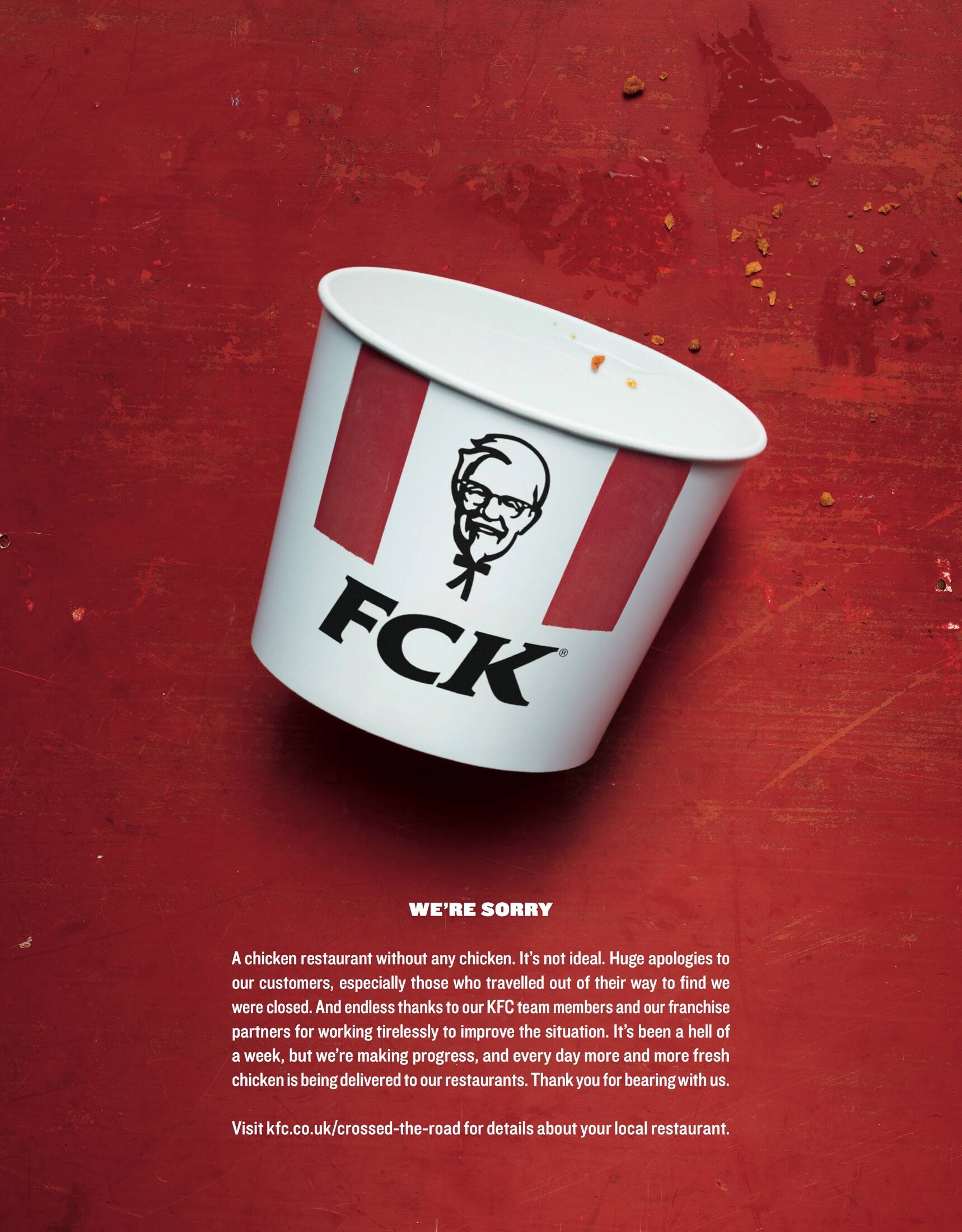
Via Ads of the World
Lesson: When the blunder is big, don't hide. A bold, well-timed apology can win over the public if it's honest, clever and still on-brand.
Cheese, But No Mac?
A customer ordered macaroni and cheese from California Pizza Kitchen (CPK) and was served only cheese. Yup, that's right: mac-less mac and cheese. The disappointed customer of course took to social media and her post quickly went viral.
In response, many brands might have issued a generic "We're sorry, here's a gift card!" reply, but CPK tried a different angle. They publicly acknowledged the mistake with their own TikTok video and offered half-off on their macaroni and cheese to all their customers for an entire month.
In addition, they apologised with a personalised card to the disappointed customer and sent her a certificate for year's worth of free macaroni and cheese.
Via YouTube
Lesson: Even with small-scale crises, personal responses can pack big PR power. Own your errors and see them as a chance to engage meaningfully with your audience.
Don't Drink and Tweet
During a (maybe too fun?) night out, someone from the Red Cross' social media team mistakenly tweeted about "gettng slizzerd" — on the official Red Cross account.
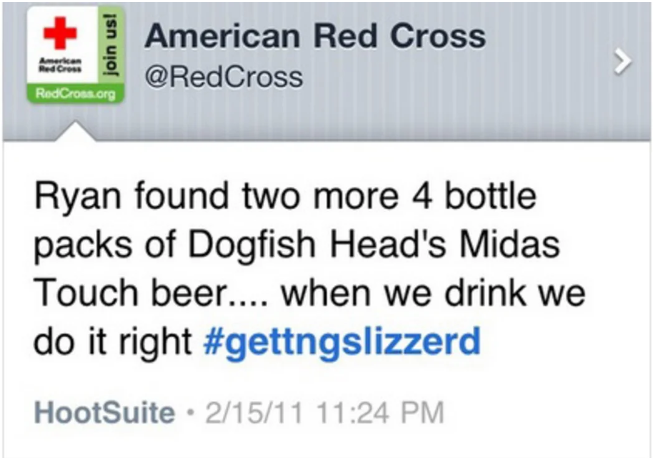
Via CNBC
The organisation refrained from going into a tailspin and leaned into humour, turning the mishap into a viral positive. They deleted the tweet, clarified the mistake and followed up with a clever post.
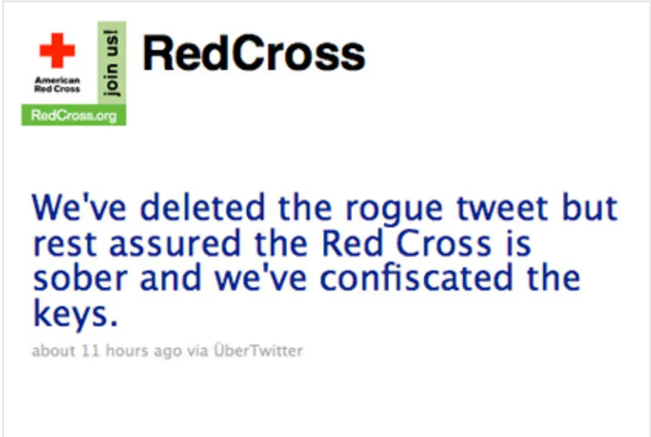 Via CNBC
Via CNBC
Dogfish even joined in, encouraging blood donations using the same hashtag.
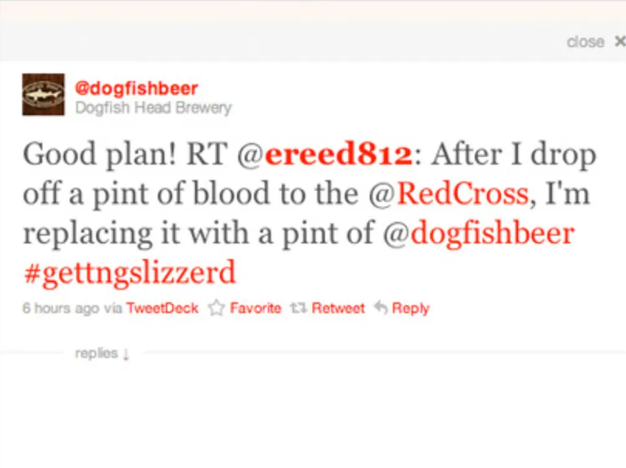
Via CNBC
Lesson: Some perceived PR problems are disguised opportunities. If your tone fits your mission, a light-hearted, human response can defuse tension and boost engagement.
Think Before You Tweet
Yes, another tweeting (or X-ing?) disaster.
In 2021, on International Women's Day, Burger King UK tweeted, "Women belong in the kitchen". The goal was to draw attention to gender inequality in culinary careers, but the tweet's clickbait tone sparked immediate backlash before context could be provided.
Burger King quickly realised their mistake, apologised and deleted the tweet. Yet, they clarified that the deleted tweet was not a way to erase their mistake, but a way to stop it from causing further harm.
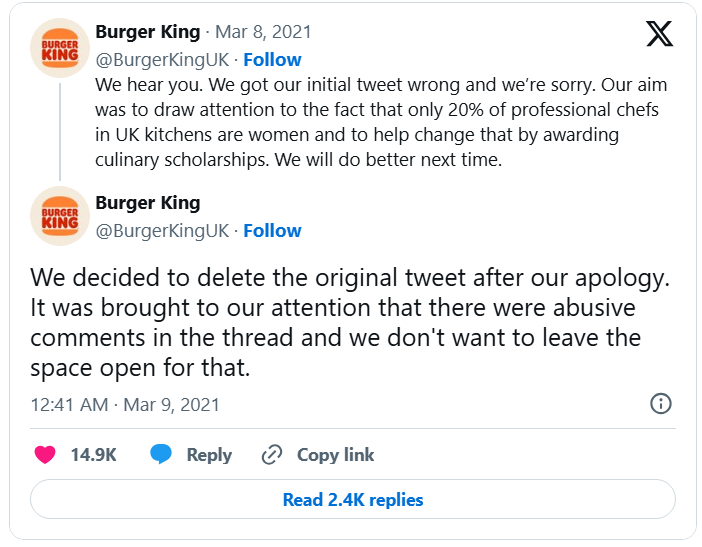
Via USA Today
Lesson: Context is everything and an apology needs to be fast, sincere and followed by corrective action.
"Believe in Something…"
When Nike made former NFL quarterback and activist Colin Kaepernick the face of its 30th anniversary 'Just Do It' campaign, the brand knew it was courting controversy.
Kaepernick had been a polarising figure in the U.S for kneeling during the national anthem to protest racial injustice — which is why Nike's decision sparked immediate backlash, with many believing there is no place for politics in sport.
However, Nike was prepared. The campaign was supported by extensive audience data that showed that the brand's core demographic valued social justice, authenticity and bold stances.
So, Nike didn't backtrack or apologise, but stood by their message and reaped the long-term rewards. Online sales jumped, stock prices rose and the campaign even won awards for its impact.
Via YouTube
Lesson: Know your brand identity. If you are going to stand for something, stand firm and weather the storm. If your values are strong and your audience is behind you, a strategic risk can become a defining moment.
PR crises aren't always preventable, but they are manageable. Whether you are fixing a small misstep or tackling a full-blown communications disaster, the core principles always stay the same: take responsibility, have a plan of action and always act with your audience in mind.
After all, a well-managed crisis doesn't just protect your brand — it could even elevate it.
Did you find this article insightful? Let us know in the comments section below.
*Image courtesy of Canva